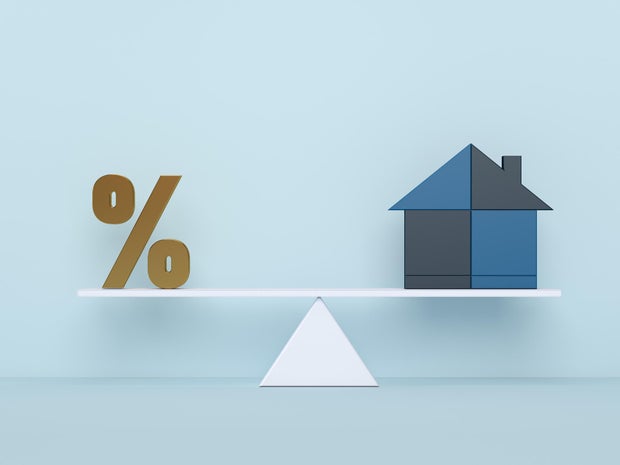Why mortgage refinancing may still be right for you
After the Federal Reserve raised its benchmark interest rate 0.75 percentage point, concerns over how the action could affect the personal finances of millions of Americans soon surfaced.
"Reducing inflation will likely require a sustained period of below-trend growth and it will very likely require a softening of labor conditions," Federal Reserve Chair Jerome Powell said in a Sept. 21 news conference.
"We will keep at it until we are confident the job is done," Powell added.
This is not great news for homebuyers, especially after the average interest rate for a 30-year mortgage hit 6% earlier in September — the highest it's been since 2008. Mortgage refinance rates are also up, hovering around 5.5 compared to 2.15% a year ago.
While an increase in rates may help tame inflation, they don't always help consumers.
That doesn't mean, however, that some homeowners may not still benefit from mortgage refinancing. In fact, even with the rate jump, select homeowners can still save money with a refinance.
If you think you could benefit from refinancing, or simply want more information on the potential benefits, speak with a mortgage specialist today.
Here are three types of homeowners who may still benefit from refinancing their mortgage.
Homeowners with high interest rates
Mortgage rates, particularly during the pandemic, hovered near record lows. But, if you have a higher interest rate (think 6% or above) you may benefit from refinancing your mortgage in today's rate environment. The best time to refinance your mortgage is often tied to your individual circumstances and preferences.
Stay on top of Freddie Mac's weekly rates to compare them against your own. If you can get a rate that's a full point less than what you currently have, most professionals would advise you to take it. Even a half-point drop may be worth it, particularly if your initial home loan was a large one.
Review the numbers and do the math. You may still be able to save money.
Homeowners who want to pay off their loan early
The 30-year home loan is the most popular, largely because it spreads out payments to a more manageable extent. But it takes decades to pay off the loan (assuming you make conventional payments and don't pay bi-weekly).
But what happens if you want to wrap up your loan sooner? If you inherit a large sum of money or simply just want to eliminate what's likely your biggest monthly bill, a mortgage refinance loan may be worth pursuing. By shortening the loan term you'll be able to pay it off and build up equity in the house faster.
Be careful, however. Reducing your loan term may make your monthly payments go up, albeit for a shorter period.
Speak with a mortgage refinance expert who can help guide you.
Homeowners who want to drop their PMI
If you initially purchased your home with a down payment of less than 20% of the home's value the lender probably tacked on private mortgage insurance (PMI) to your monthly bill. You may be able to refinance your mortgage loan to remove this payment if your home value has grown since the time of purchase.
If you own a home in a part of the country where values have risen, then you may be unnecessarily paying the PMI. Refinancing could help eliminate it. Just make sure the numbers make sense (for example, you don't want to refinance to eliminate an $80 PMI and have your monthly payment go up $160 overall).
A mortgage expert can help determine if you're a good candidate.
State of mortgage refinancing
The current state of mortgage rates and mortgage refinance rates are clearly not as advantageous as they were in 2020 and parts of 2021. But, if inflation doesn't cool, the current rate environment may be the best homebuyers and homeowners can expect for the foreseeable future. So don't dismiss the potential benefits of refinancing, even now.
Not sure if it's the right time for you? Consider working with an online financial adviser who can help you.
Other alternatives
If a conventional mortgage refinance doesn't sound beneficial for your circumstances, consider your other options. Here are two that may help:
Cash-out refinancing: This alternative allows a homeowner to take out a new mortgage loan for an amount larger than what they owe on their current loan. They then use the new loan to pay off the old one and pocket the difference between the two as cash. That cash can be used as the owner sees fit.
Reverse mortgage: This option permits homeowners (62 and older) who have completely paid off or paid off most of their mortgage to take out a portion of their home's equity. This would qualify as tax-free income. It needs to be repaid, however, if the homeowner dies or elects to sell the home. Still, it may be worth pursuing if the cash is needed.
Think one of these alternatives works best for you? Speak to a mortgage refinance expert who can help advise you.




